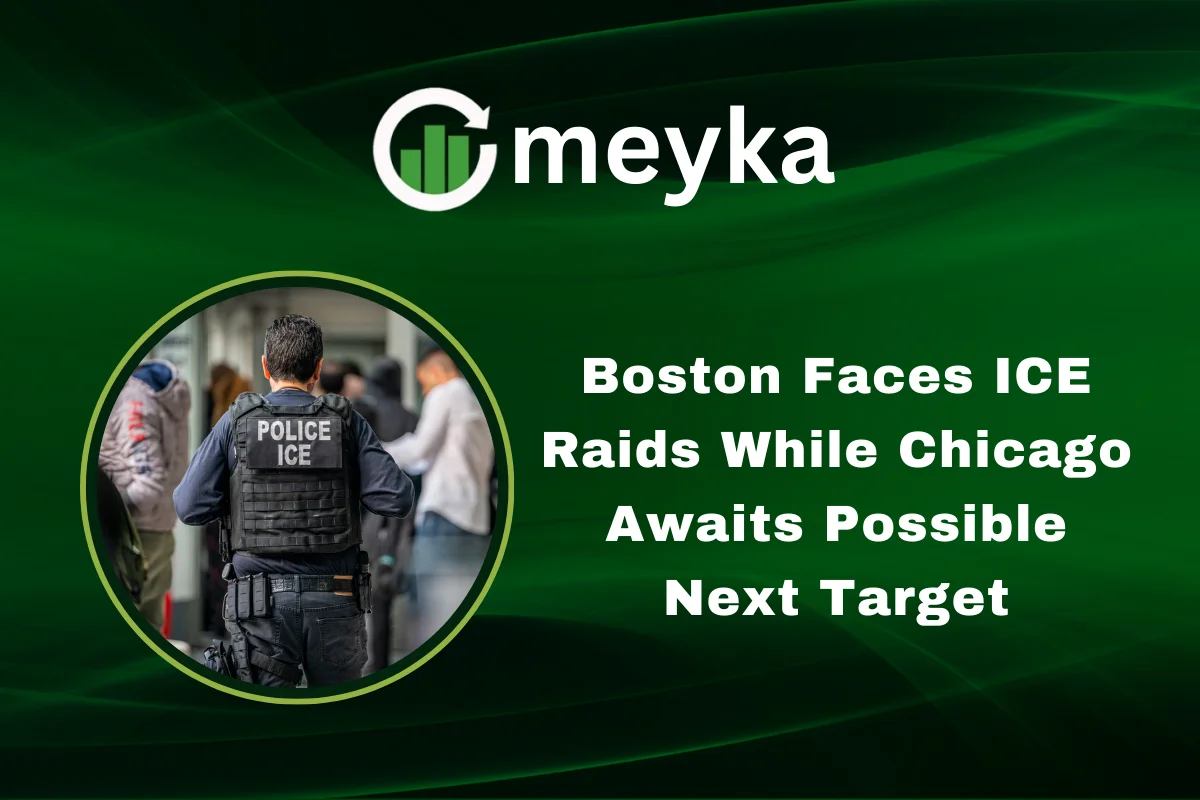Boston Faces ICE Raids While Chicago Awaits Possible Next Target
Immigration enforcement in the United States is once again in the spotlight. Boston has recently faced a wave of ICE raids, leaving immigrant communities anxious and uncertain about what may come next. As these operations unfold, many fear that Chicago could be the next target, with officials, advocacy groups, and residents closely watching the developments.
ICE Raids in Boston: A Community on Edge
The Immigration and Customs Enforcement (ICE) agency has been carrying out targeted enforcement operations in Boston. These raids are aimed at individuals with prior deportation orders, criminal records, or pending immigration cases. However, local reports indicate that even those without serious offenses have been swept up in these operations, sparking outrage and fear.
Boston has a rich immigrant history, and nearly one in five residents is foreign-born. For many families, the raids have disrupted daily life. Parents worry about leaving their homes, children fear returning from school to find their loved ones gone, and small businesses run by immigrants face declining activity.
Community leaders in Boston argue that ICE’s approach is creating a climate of distrust. Some immigrants have become reluctant to report crimes, seek healthcare, or engage with public services, fearing that any interaction could expose them to enforcement actions.
Why Chicago Is Bracing for Possible ICE Operations
While Boston experiences these crackdowns, Chicago is preparing for the possibility of being the next major city targeted by ICE raids. The city is no stranger to immigration enforcement pressure. Chicago is known as a “sanctuary city,” with local policies limiting cooperation with federal immigration authorities.
This stance has made Chicago both a haven for immigrants and a frequent target for federal criticism. Advocates worry that new enforcement actions could specifically test Chicago’s resistance to ICE involvement. If raids occur, the impact could ripple across neighborhoods where immigrant communities are central to the city’s economy and cultural identity.
Local organizations have already started preparing by educating immigrants about their rights, offering legal assistance, and providing community hotlines.
National Context: Immigration Policy Under Pressure
The ICE raids in Boston and the potential targeting of Chicago cannot be viewed in isolation. They are part of a larger national debate on immigration policy. Enforcement priorities have shifted with different administrations, but the underlying tension remains the same: how to balance border security with human rights and community trust.
Critics argue that large-scale raids destabilize communities without addressing root causes like outdated immigration laws, backlogged courts, and a lack of legal pathways for workers. Supporters, however, maintain that ICE operations are necessary to remove individuals who violate immigration laws or pose security risks.
The broader political climate around immigration has only heightened the stakes. As elections approach, immigration enforcement often becomes a headline issue, shaping public opinion and influencing policy discussions at both the local and national levels.
Economic and Social Impact on Cities
When ICE raids sweep through cities like Boston, the effects go beyond immediate arrests. They reverberate through entire communities:
- Labor Markets: Many immigrants play essential roles in industries such as construction, food services, and healthcare. Raids disrupt workplaces and leave employers scrambling to fill critical roles.
- Small Businesses: Family-owned shops and restaurants see fewer customers as fear keeps people indoors.
- Education: Children in immigrant households struggle with anxiety, which affects school attendance and performance.
- Healthcare Access: Fear of detention often keeps immigrants from visiting doctors, leading to broader public health risks.
Chicago, with its large immigrant workforce and bustling economy, could face similar disruptions if it becomes the next target.
Community Response and Resistance
Across Boston, resistance has been strong. Local officials, advocacy groups, and religious leaders have spoken out against ICE raids. Many argue that targeting hardworking families undermines trust between communities and law enforcement.
In Chicago, preparations are already visible. Churches and nonprofit organizations are offering “safe spaces,” while legal aid groups are distributing “Know Your Rights” guides. City officials have reaffirmed Chicago’s sanctuary status, pledging that local law enforcement will not act as an extension of federal immigration agents.
The response highlights a key divide: federal authorities continue to push for strict enforcement, while local communities emphasize compassion, inclusion, and protection of residents.
The Role of Media and Public Opinion
The way ICE raids are covered in the media significantly shapes public opinion. Headlines focusing on crime and enforcement tend to strengthen calls for more aggressive action. Meanwhile, stories highlighting families torn apart or hardworking individuals targeted often spark sympathy and push for reform.
Social media also plays a crucial role, with advocacy groups sharing real-time updates on raids and spreading information on immigrant rights. This digital activism ensures that enforcement actions do not go unnoticed and helps communities mobilize quickly.
Looking Ahead: What’s Next for Boston and Chicago?
For now, Boston continues to feel the direct impact of ICE raids. Families remain on edge, while advocacy groups work tirelessly to provide support. The situation in Chicago remains uncertain, but the city’s history and demographics suggest it could face similar enforcement operations soon.
Both cities highlight the complex balance between national immigration policy and local realities. As the debate over immigration enforcement continues, the outcome will shape not only the future of Boston and Chicago but also the national conversation on how America treats its immigrant communities.
FAQs
Immigrants have the right to remain silent, refuse entry to officers without a proper warrant, and contact an attorney. Legal aid groups recommend carrying a rights card for quick reference.
Chicago has policies that limit cooperation between local police and federal immigration authorities, aiming to protect immigrant residents and encourage trust in public services.
Raids disrupt labor markets, harm small businesses, reduce consumer confidence, and create instability in industries that rely on immigrant workers.
Disclaimer:
This content is made for learning only. It is not meant to give financial advice. Always check the facts yourself. Financial decisions need detailed research.






